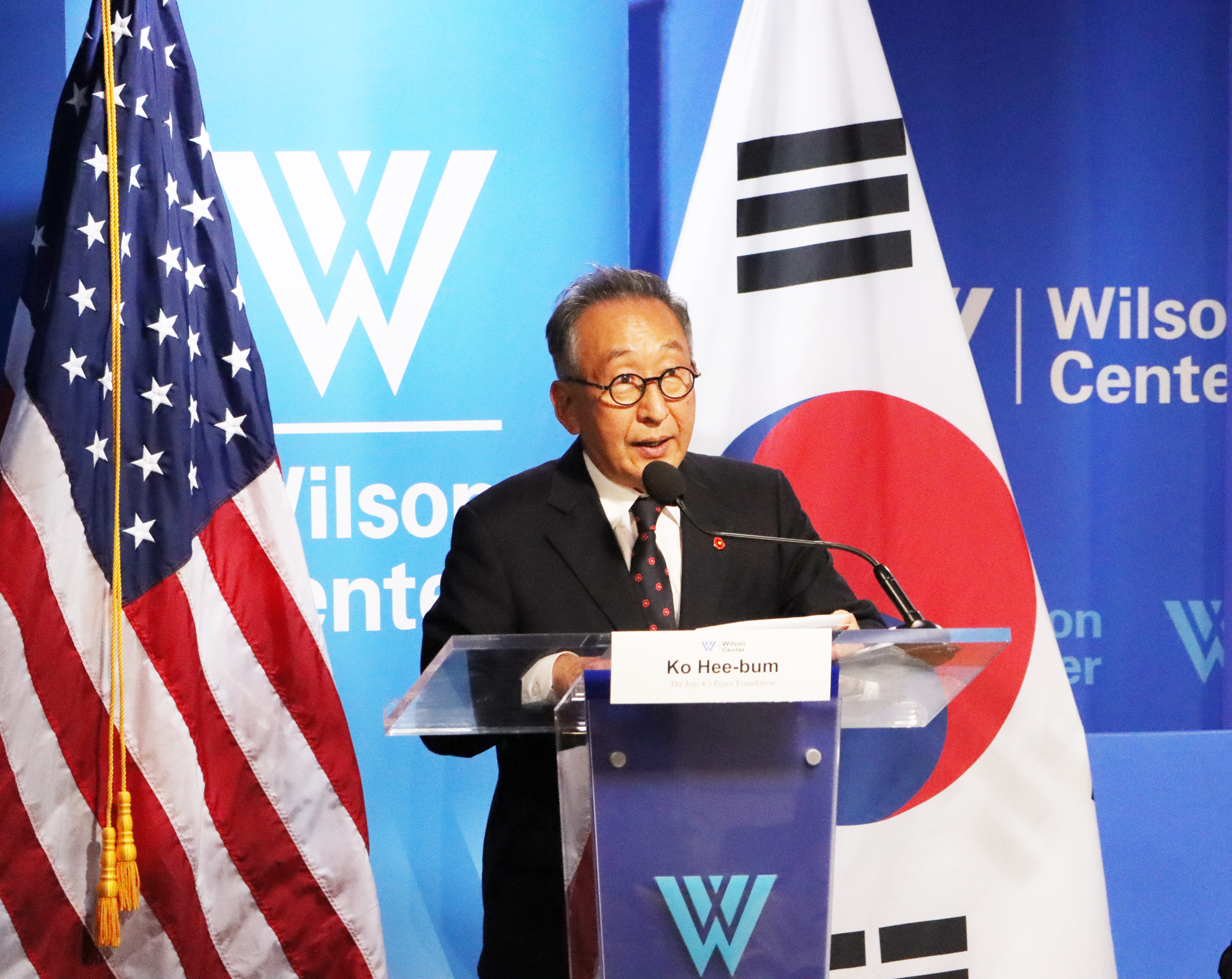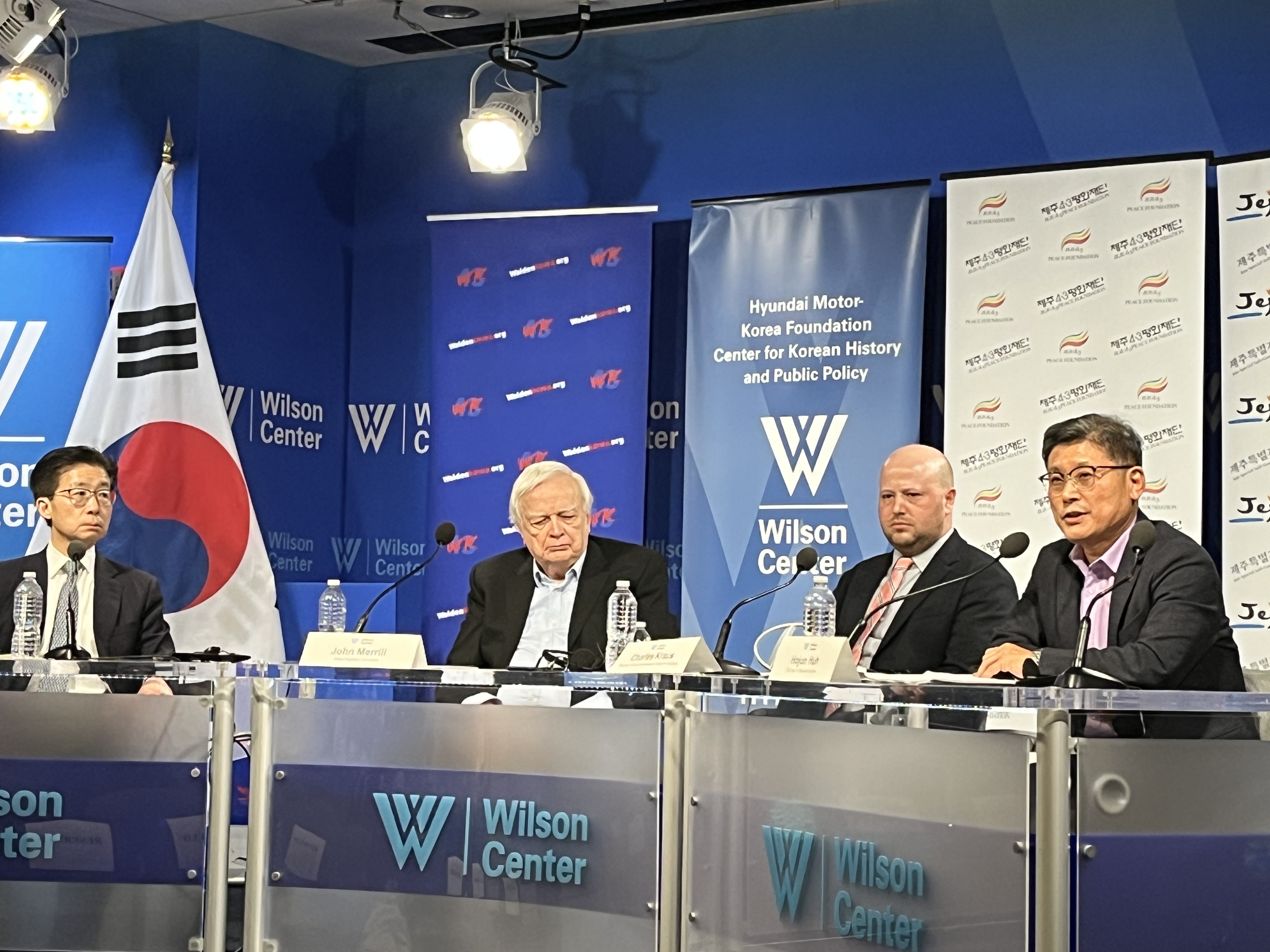Holding the United States accountable in Washington D.C.
News Focus I
Holding the United States accountable in Washington D.C.
Symposium titled “U.S.-Korea Relations: Retrospective on the Jeju April 3 Incident, Human Rights, and Alliance”
Kim Dong-hyun
Head Director of the Jeju People’s Artists Federation, Literary Critic
 ++ On Dec. 8, 2022, a symposium titled “U.S.-Korea Relations: Retrospective on the Jeju April 3 Incident, Human Rights, and Alliance” was held at the Woodrow Wilson Center, Washington D.C.
++ On Dec. 8, 2022, a symposium titled “U.S.-Korea Relations: Retrospective on the Jeju April 3 Incident, Human Rights, and Alliance” was held at the Woodrow Wilson Center, Washington D.C.
The finish line for restoring honor to the victims of Jeju 4·3 would be eliciting a genuine apology from the American government. The United States Army Military Government in Korea, which occupied South Korea in September 1945, was the de facto power behind the shootings on March 1, 1947, and the scorched earth operation during Jeju 4·3. The three years of U.S. military rule after Korea was liberated from Japan was also the time of its substantial occupation of South Korean society, particularly its politics, economy, and culture. The Jeju 4·3 Incident Investigation Report presents a range of evidence that proves the U.S. role in the March 1 shootings and the subsequent general strike on March 10, as well as the ensuing suppression by the constabulary forces. The ideological conflict between the U.S. and the Soviet Union after World War II formed a backdrop for the atrocious massacres where physical violence was employed to suppress the Korean people’s aspiration to establish an independent sovereign state. This gives a reason for why we should hold responsible not just President Rhee Syngman and the South Korean military and police but also the U.S. government and the U.S. military government in Korea for what happened during Jeju 4·3.
Although efforts have continued to be made concerning the U.S. accountability issues since the Jeju 4·3 Special Act was legislated, the American public still lacks awareness of Jeju 4·3, let alone of the need for a sincere apology for the dark past of the U.S. government.
As shown in the symbolic video of the burning of Ora Village, which provided an excuse for the hardline suppression of Jeju 4·3, the U.S. military government was a de facto aerial commander that supervised and managed the ground-level massacre. In recent years, a shared concern was formed that identifying the U.S. role in Jeju 4·3 is necessary in order to conclude the last chapter of the truth-finding campaign. This has driven efforts to draw attention from the United Nations and the international community to the truth of Jeju 4·3.
A significant step towards this aim was taken on Dec. 8, 2022, by holding a symposium in Washington D.C. concerning the U.S. role in Jeju 4·3. Titled “U.S.-Korea Relations: Retrospective on the Jeju April 3 Incident, Human Rights, and Alliance”, the symposium was hosted by the Woodrow Wilson Center, a bipartisan institute for public policy established by the U.S. Congress, and organized jointly by the Jeju 4·3 Peace Foundation, the Jeju Special Self-Governing Province, and the U.S.-based academic and cultural organization Walden Korea. The speakers invited from Jeju featured Yang Jo Hoon, a member of the national Jeju 4·3 Committee who has striven to discover the truth of Jeju 4·3, as well as Huh Ho-joon, a senior staff writer at The Hankyoreh. The American panelists included Sung-Yoon Lee, a professor at Tufts University, John Merrill, former Chief of the Northeast Asia Division at the Department of State Bureau of Intelligence and Research, and Kathleen Stephens, former U.S. Ambassador to Korea. The symposium was meaningful in that it allowed for discussions on the U.S. role in Jeju 4·3 between Korean scholars specializing in the historical event and prominent American experts with a deep understanding of the related issues.
Sung-Yoon Lee has profound knowledge of current issues in U.S. politics and is well-known for actively delivering messages from American conservative politicians to Korean society. Despite his relatively conservative stance on the Korean political landscape, the renowned historian strongly raised issues of the U.S. role in Jeju 4·3. He claimed that the South Korean instruments of force lay under the operational control of the U.S. military government during the period following the establishment of the Republic of Korea in accordance with the ROK-U.S. agreement. Reflecting on the two countries’ “ironclad” alliance, he stated that the bilateral relationship has grown tremendously over the last seven decades based on the shared values of democracy, peace, freedom, and justice. Yet, the United States oversaw in Jeju those events of 75 years ago that portray the opposite of democracy, human rights, peace, and justice, he emphasized. “An extreme human rights violation like this can never be swept under the rug,” he said, calling for efforts to educate about and remember the issue. His perception that the ROK-U.S. alliance is an international relationship based on democracy pinpoints the need for the U.S. government to face frankly its dark past of abandoning its own ideal of democracy. In particular, he called for President Biden to visit the Jeju 4·3 Peace Park with the Korean President as a way of honoring the victims and healing the wounds of their families. “We can start with a low-level person visiting the Jeju 4·3 Peace Park, making a principal remark in solidarity with the victims,” he said.
Yang Jo Hoon and Huh Ho-joon gave presentations on the movement to discover the truth of Jeju 4·3, sharing different pieces of evidence that prove the direct involvement of the U.S. government in the case. As U.S. citizens lack understanding of the historical event, the documents showing proof received a great response from the speakers and the audience. The presentations by the Jeju-based researchers helped bring attention to the need for strengthened efforts to teach American society about the factual evidence of the U.S. responsibility for Jeju 4·3. The panelists shared the understanding that in order to identify the U.S. role in the historical event, it is necessary to educate the public on the faults of the U.S. government, and, at the same time, to emphasize the universal value of human rights.
Ambassador Kathleen Stephens recalled her visit to Jeju in the 1970s, stressing that the issues of Jeju 4·3 should not be overlooked for the sake of strengthened bilateral ties between South Korea and the United States. Recognizing that the United States has played a key role in more honest and strong relations with Korea, she said, “I’m sure we have had some missed opportunities and we have work to do ahead.” Given her status as a former high-ranking government official, her statement was considered important as it implies that U.S. politicians perceive the U.S. role in Jeju 4·3 as a serious issue.
John Merrill, who authored the first dissertation on Jeju 4·3 in the United States, also strongly pointed out that the U.S. military government was in charge and should have exercised oversight on the South Korean police and the Northwest Youth League that were the main culprits of the Jeju massacre. The political specialist referred to the dark past of the American government in dealing with insurgent movements in the third world, understanding Jeju 4·3 as a proxy war. “They were a proxy,” he said, explaining that U.S. intelligence, the U.S. military government, and the South Korean government subcontracted the dirty work out to the Northwest Youth League members just as it did in other countries around the world.
The American speakers urged both South Korea and the United States to make joint efforts to defend the value of democracy, going beyond the demand that the U.S. government not turn away from the Jeju 4·3 issues.
The first session of the symposium was followed by a roundtable meeting where the panelists discussed the practical process and path of claiming the U.S. responsibility for Jeju 4·3. Frank Jannuzi, president of the Mansfield Foundation, made some noteworthy statements during the discussions. From 1997 to 2012, Jannuzi worked for the U.S. Senate Foreign Relations Committee, where he advised Committee Chairman Joseph Biden on foreign policy agendas. For more than 30 years, the specialist has dealt with international politics, such as the Korean Peninsula issues in the U.S. government, the U.S. Congress, and international organizations. “We need to be brutally realistic about the need for political pressure on the administration to care about this issue,” he emphasized, concerning the acknowledgement of the U.S. role in Jeju 4·3. According to the foreign policy specialist, it is necessary to make diverse efforts to draw the U.S. government’s attention to its role in human rights violations during Jeju 4·3, including appealing to congressmen who care about America’s misconduct on the Korean Peninsula. His advice indicates that raising awareness of Jeju 4·3 in American society and in the American political blocs should be the first step, given the difficulties in receiving an apology from the U.S. government. It is also understood as a call for educating the conservative Korean-American community on Jeju 4·3 and collaborating with progressive civic groups in the United States.
Additionally, participants agreed that works of art and culture will help educate the American public, just as the truth of Jeju 4·3 began to be disclosed through the related arts and cultural campaign.
Throughout the symposium, the speakers and the panelists called for the U.S. government to acknowledge its role in Jeju 4·3 for the sake of further strengthening the universal value of human rights in American society.
“I invite you to the process of a just solution based on the truth,” said Koh Hee-bum, President of the Jeju 4·3 Peace Foundation. His appeal was responded to by the American speakers and panelists who showed empathy with the call that it is now time for the United States to face the truth of Jeju 4·3.
Evidently, Jeju 4·3 is a historical tragedy that resulted from the Cold War. The time has come to face the truth so as to overcome the tormenting and heartbreaking tragedy. This is why we should strive for the just resolution of Jeju 4·3 in Korea, laying a cornerstone for drawing a significant change in American society.
 ++ Ko Hee-bum, president of the Jeju 4·3 Peace Foundation, delivers the opening speech.
++ Ko Hee-bum, president of the Jeju 4·3 Peace Foundation, delivers the opening speech.
 ++ The participants of the symposium take a commemorative photo.
++ The participants of the symposium take a commemorative photo.
 ++ Panelists hold discussions featuring Sung-Yoon Lee, a professor at Tufts University, John Merrill, former Chief of the Northeast Asia Division at the Bureau of Intelligence and Research, U.S. Department of State, Charles Kraus, Deputy Director for the History and Public Policy Program at the Woodrow Wilson Center, and Huh Ho-joon, a senior staff writer at The Hankyoreh. (From left to right)
++ Panelists hold discussions featuring Sung-Yoon Lee, a professor at Tufts University, John Merrill, former Chief of the Northeast Asia Division at the Bureau of Intelligence and Research, U.S. Department of State, Charles Kraus, Deputy Director for the History and Public Policy Program at the Woodrow Wilson Center, and Huh Ho-joon, a senior staff writer at The Hankyoreh. (From left to right)